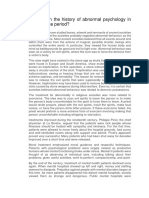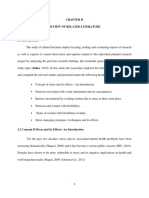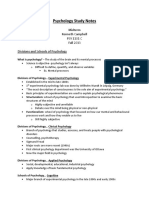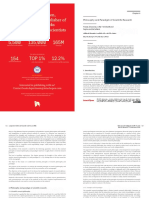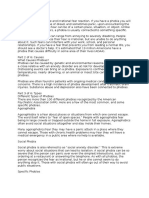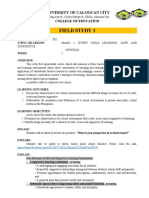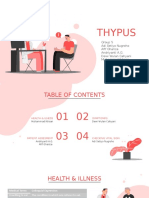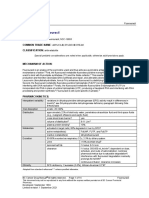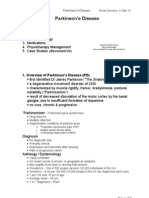Chapter 5 Depression and Anxiety
Chapter 5 Depression and Anxiety
Uploaded by
Christian VillaCopyright:
Available Formats
Chapter 5 Depression and Anxiety
Chapter 5 Depression and Anxiety
Uploaded by
Christian VillaCopyright
Available Formats
Share this document
Did you find this document useful?
Is this content inappropriate?
Copyright:
Available Formats
Chapter 5 Depression and Anxiety
Chapter 5 Depression and Anxiety
Uploaded by
Christian VillaCopyright:
Available Formats
CHAPTER 5:
CONCLUSION AND RECOMMENDATION
CONCLUSION
Depression is a widespread occurrence that results in pain, functional impairment, an
increased risk of suicide, increased health-care costs, and lost productivity. When
depression develops alone or in conjunction with other medical conditions, effective
therapies are available. Anxiety disorders make people fearful, upset, or uneasy in
settings when most people would not. Anxiety problems can make it difficult for pupils to
complete schoolwork or study if they are not treated. It may also have an impact on their
relationships with their peers and teachers. Anxiety and depression have a significant
impact on a student’s academic performance as well as their extracurricular activities.
Anxiety and depression have a negative impact on academic performance and promote
underachievement. Students with a high level of anxiety do worse than their peers on IQ
and achievement exams. Students with anxiety problems may find it difficult to complete
schoolwork or study. It may also have an impact on their relationships with their peers
and teachers. Anxiety issues might cause students to miss a lot of school days. They
may also choose to skip school entirely. Because melancholy and anxiety can impede
working memory, making it difficult to remember new information and recollect old
events, their learning is generally hampered. Anxiety and depression have a negative
impact on academic performance and contribute to underachievement. Students who
are under a lot of stress perform worse on IQ and achievement assessments.
RECOMMENDATION
Anxiety and Depression was a huge difficulty for a student in terms of their performance
in their school. Stopping and preventing anxiety and depression can result for a huge
step up for a student’s mental health. Cut all the negative things that keep bothering
you. Allow yourself to have peace of mind. Avoid negative people. Have some
relaxation. Avoid overthinking too much. Always keep positive. Reduce stress and
refuse stressful happenings. Put yourself first. Maintain proper diet and pumped
yourself. Enjoy yourself and allow yourself to be happy. Depression can sap your vitality
and leave you feeling drained and exhausted. It can be tough to gather the courage or
motivation to seek treatment as a result of this. You may, however, take tiny actions to
help you feel more in control and improve your overall well-being. Get enough sleep,
consume a healthy diet, and exercise on a regular basis. When things get tough, reach
out to family and friends for support. Get frequent medical exams, and if you don’t feel
well, consult your doctor. If you suspect you’re depressed, seek help. Prevention may
open up new avenues for reducing the illness burden associated with depressive
disorders. Prevention, according to an Institute of Medicine report, is any measure
targeted at preventing the onset of new cases of mental disorders in people who do not
yet fit the criteria for one. Depression prevention can lead to a healthy and happy
existence, so don’t let yourself down by choosing to be responsible enough to control
your own life.
You might also like
- Breuss Cure PDFDocument140 pagesBreuss Cure PDFsupergtorNo ratings yet
- Places That Matter: Knowing Your Neighborhood through DataFrom EverandPlaces That Matter: Knowing Your Neighborhood through DataNo ratings yet
- Diagnosis - Reflective EssayDocument3 pagesDiagnosis - Reflective EssayConnor JefferiesNo ratings yet
- 1st Summative Test in MAPEH 6 1st QuarterDocument2 pages1st Summative Test in MAPEH 6 1st QuarterCristina Belleza Estoque94% (18)
- Write Down The History of Abnormal Psychology in Renaissance PeriodDocument12 pagesWrite Down The History of Abnormal Psychology in Renaissance PeriodKashish GautamNo ratings yet
- Bullying at The Fire Station? Perceptions Based On Gender, Race and Sexual OrientationDocument11 pagesBullying at The Fire Station? Perceptions Based On Gender, Race and Sexual OrientationLexipol_Media_Group67% (3)
- Review of Related LiteratureDocument28 pagesReview of Related LiteratureporseenaNo ratings yet
- Measurement of Interpersonal AttractionDocument2 pagesMeasurement of Interpersonal AttractionAnooshayNo ratings yet
- Final Syllabus Forensic Psychology Spring 2016Document6 pagesFinal Syllabus Forensic Psychology Spring 2016Karla PereraNo ratings yet
- Midterm Study Notes Psy1101Document16 pagesMidterm Study Notes Psy1101Simon HagosNo ratings yet
- Child Abuse and Its Impact On Students' Psychological Well Being in NDU MunicipalityDocument19 pagesChild Abuse and Its Impact On Students' Psychological Well Being in NDU MunicipalityEditor IJTSRDNo ratings yet
- Outcomes Map Mental HealthDocument16 pagesOutcomes Map Mental HealthMayniarAyuRahmadianti100% (1)
- Threats To Internal ValidityDocument13 pagesThreats To Internal ValidityDani PhilipNo ratings yet
- HADS The Hospital Anxiety and Depression ScaleDocument4 pagesHADS The Hospital Anxiety and Depression ScaleMihaela ZamfirNo ratings yet
- The Effect of Academic Stress Upon The Anxiety and Depression Levels of Gifted High School StudentsDocument6 pagesThe Effect of Academic Stress Upon The Anxiety and Depression Levels of Gifted High School StudentsCristina Maria BostanNo ratings yet
- The Effects of Anxiety and Depression in Academic Performance of Students in HCCDDocument1 pageThe Effects of Anxiety and Depression in Academic Performance of Students in HCCDAndy EgutNo ratings yet
- Research Philosophy and Paradigms NotesDocument11 pagesResearch Philosophy and Paradigms NotesBenson Baraza100% (1)
- Chapter 2 1Document5 pagesChapter 2 1Ayisha AskaNo ratings yet
- Test AnxietyDocument23 pagesTest AnxietyClaire ZahraNo ratings yet
- Types of Anxiety According To Sigmnd FreudDocument13 pagesTypes of Anxiety According To Sigmnd FreudSamuel Sam100% (1)
- Adjustment of Special PopulationDocument9 pagesAdjustment of Special PopulationAbdul LatifNo ratings yet
- What Are PhobiasDocument8 pagesWhat Are PhobiasAida NasrinNo ratings yet
- CBT AnxietyDocument4 pagesCBT AnxietyBombey GymnectNo ratings yet
- Gender Dysphoria: Agnes B. Padilla MD, DPBP, FppaDocument25 pagesGender Dysphoria: Agnes B. Padilla MD, DPBP, FppaSivaganesh Paidi100% (2)
- Personality DisordersDocument4 pagesPersonality DisordersAngela Abigail AbingNo ratings yet
- Chapter 3 Psycho Metrics Reliatility ValidityDocument23 pagesChapter 3 Psycho Metrics Reliatility ValidityUzaima SiddiquiNo ratings yet
- Experimental Psychology - Prelim ReviewerDocument12 pagesExperimental Psychology - Prelim RevieweragikagikhoNo ratings yet
- Survey-Questionnaire-1 RESEARCHDocument2 pagesSurvey-Questionnaire-1 RESEARCHRowena GregorioNo ratings yet
- Milgram Experiment GoodDocument17 pagesMilgram Experiment GoodWali RizviNo ratings yet
- Ethical Issues in Psychological ResearchDocument19 pagesEthical Issues in Psychological ResearchjuliatsyganNo ratings yet
- Psychological Assessment: (Insert and PDF Palihug Te Hehe)Document6 pagesPsychological Assessment: (Insert and PDF Palihug Te Hehe)Casas, Jo-an Pauline A.100% (1)
- Als Self Esteem Survey QuestionnaireDocument2 pagesAls Self Esteem Survey QuestionnaireGerry BaylonNo ratings yet
- Unit 1 - Health Psychology - More On Health Behaviour and TheoriesDocument24 pagesUnit 1 - Health Psychology - More On Health Behaviour and TheoriesSheeba ShamsudeenNo ratings yet
- Field Study 1: University of Caloocan CityDocument7 pagesField Study 1: University of Caloocan CityLovelyn MaristelaNo ratings yet
- Neurotransmitters &: Their Mode of ActionDocument45 pagesNeurotransmitters &: Their Mode of ActionAshani AaroraNo ratings yet
- 5.2 Substance Use DisordersDocument40 pages5.2 Substance Use DisordersJacinta SmithNo ratings yet
- Lesson 2 The Skills Activities of A Clinical PsychologistDocument6 pagesLesson 2 The Skills Activities of A Clinical Psychologistjericho anchetaNo ratings yet
- Thesis - EnglishDocument17 pagesThesis - EnglishKyle Cayaban100% (1)
- Barefoot Movie (Features of Abnormality)Document4 pagesBarefoot Movie (Features of Abnormality)Nino Joycelee TuboNo ratings yet
- What Is Psychoanalytic Therapy: Dream Interpretation: According To Freud, Dream Analysis Is by Far TheDocument2 pagesWhat Is Psychoanalytic Therapy: Dream Interpretation: According To Freud, Dream Analysis Is by Far Thebuhari rabiuNo ratings yet
- Field Methods in Psychology PrelimsDocument22 pagesField Methods in Psychology Prelimsale.cristian100% (1)
- The Importance of Mental HealthDocument1 pageThe Importance of Mental HealthRayden AlphaNo ratings yet
- The Effect of A Community Mental Health Training Program For Multidisciplinary Staff PDFDocument5 pagesThe Effect of A Community Mental Health Training Program For Multidisciplinary Staff PDFAzuan SalimNo ratings yet
- Schizophrenia Final PaperDocument6 pagesSchizophrenia Final Paperchad5844No ratings yet
- Biosocial Theory and Transactional Model PowerpointDocument14 pagesBiosocial Theory and Transactional Model PowerpointAmy Powers100% (1)
- College Students and DepressionDocument6 pagesCollege Students and Depressiontink0791No ratings yet
- Ethical Issues in Psychological Testing and AssessmentDocument18 pagesEthical Issues in Psychological Testing and AssessmentEhla Silverio-VitoNo ratings yet
- Conmon Mental Health ProblemsDocument7 pagesConmon Mental Health ProblemsMarienuelle AquinoNo ratings yet
- Ethical, Legal, and Professional Issues: Sattler Chapter 3Document18 pagesEthical, Legal, and Professional Issues: Sattler Chapter 3alex cabralNo ratings yet
- Human Behavior and Crisis Management Manual 2017 Part 1Document10 pagesHuman Behavior and Crisis Management Manual 2017 Part 1danNo ratings yet
- Ethics in PsychologyDocument20 pagesEthics in PsychologySarah LadeNo ratings yet
- Counseling ApproachesDocument91 pagesCounseling ApproachesAysalkyn AydarovaNo ratings yet
- 2008 05 07 144315charlie - Magne - CabangalDocument121 pages2008 05 07 144315charlie - Magne - CabangalAbdul Javar Duran Esturco100% (1)
- How The Experimental Method Works in Psychology-1Document55 pagesHow The Experimental Method Works in Psychology-1Paul MorakinyoNo ratings yet
- Week 17 - THEORIES OF AGING - EACDocument44 pagesWeek 17 - THEORIES OF AGING - EACPaul Deliyos100% (1)
- Phys HealthDocument19 pagesPhys HealthJulianna Bartalus100% (1)
- Agoraphobia in Adults - Epidemiology, Pathogenesis, Clinical Manifestations, Course, and Diagnosis PDFDocument8 pagesAgoraphobia in Adults - Epidemiology, Pathogenesis, Clinical Manifestations, Course, and Diagnosis PDFdreamingNo ratings yet
- 103 CH 1 Papalia F14 PDFDocument26 pages103 CH 1 Papalia F14 PDFsscibdNo ratings yet
- Test Conceptualization: Norm-Referenced Vs Criterion-ReferencedDocument7 pagesTest Conceptualization: Norm-Referenced Vs Criterion-ReferencedNarona MaurenNo ratings yet
- Psychology Worlds Issue 10: Ethics In Psychology A Psychology Student's And Professional's Guide To Ethical Research: Psychology Worlds, #10From EverandPsychology Worlds Issue 10: Ethics In Psychology A Psychology Student's And Professional's Guide To Ethical Research: Psychology Worlds, #10No ratings yet
- Chapter 5Document3 pagesChapter 5Dana Andrea MendiolaNo ratings yet
- RRL 6pagesDocument6 pagesRRL 6pagesChristian VillaNo ratings yet
- The Trends of Digital CommunicationDocument2 pagesThe Trends of Digital CommunicationChristian VillaNo ratings yet
- THE PHILIIPPINES: The Past Revisited by Renato ConstantinoDocument8 pagesTHE PHILIIPPINES: The Past Revisited by Renato ConstantinoChristian VillaNo ratings yet
- Conclusion RizalDocument3 pagesConclusion RizalChristian Villa100% (1)
- Chapter 1 DSWD Mr. Alfredo RevisedDocument10 pagesChapter 1 DSWD Mr. Alfredo RevisedChristian VillaNo ratings yet
- Chapter 3 CookeryDocument3 pagesChapter 3 CookeryChristian VillaNo ratings yet
- Claim Letter and Letter of AdjustmentDocument3 pagesClaim Letter and Letter of AdjustmentChristian VillaNo ratings yet
- Deconstructing Disability and NeurodiversityDocument20 pagesDeconstructing Disability and NeurodiversityLorena RodríguezNo ratings yet
- Thypus: Group 5 Adi Setiyo Nugroho Afif Ghariza Andriyanti A.G. Dewi Wulan Cahyani Muhammad IkhsanDocument11 pagesThypus: Group 5 Adi Setiyo Nugroho Afif Ghariza Andriyanti A.G. Dewi Wulan Cahyani Muhammad IkhsanikhsanNo ratings yet
- Interpretation of Results ReportingDocument7 pagesInterpretation of Results ReportingMerill Harrelson LibanNo ratings yet
- First Aid - NotesDocument10 pagesFirst Aid - NotesRoisin McdonnellNo ratings yet
- 2223 2 Sehh2232Document5 pages2223 2 Sehh2232Jacky AKA BrizzardNo ratings yet
- Pat An AnewDocument126 pagesPat An AnewgshchurovskiyNo ratings yet
- TerjemahanDocument3 pagesTerjemahanRyski RahmaliaNo ratings yet
- CANCERDocument2 pagesCANCERShravya S MallyaNo ratings yet
- Ms Test-Questio 2Document24 pagesMs Test-Questio 2Jackie AbarraNo ratings yet
- Introduction To Expert Systems - MYCINDocument8 pagesIntroduction To Expert Systems - MYCINVictoria OffomaNo ratings yet
- Patient Dialogue: Cerebral Palsy DiplegyDocument4 pagesPatient Dialogue: Cerebral Palsy DiplegyResyaNurAuliaNo ratings yet
- DRUG NAME: Fluorouracil: Synonym (S) : Common Trade Name: ClassificationDocument14 pagesDRUG NAME: Fluorouracil: Synonym (S) : Common Trade Name: ClassificationNurul Kamilah SadliNo ratings yet
- A 65-Year-Old Man Came To The Emergency Department Via Ambulance - Relatives Accompanied The Patient and Described A 1-Day History of FeverDocument43 pagesA 65-Year-Old Man Came To The Emergency Department Via Ambulance - Relatives Accompanied The Patient and Described A 1-Day History of FeverandriopaNo ratings yet
- Systemic Lupus ErythematosusDocument25 pagesSystemic Lupus Erythematosusdalia100% (1)
- Y4 CBL4 Student Sheet Substance MisuseDocument3 pagesY4 CBL4 Student Sheet Substance Misusecasapu.irinaNo ratings yet
- Pediatric Pharyngotonsillitis Sore ThroatDocument5 pagesPediatric Pharyngotonsillitis Sore Throatdef_10No ratings yet
- How To Get LTCI For Your CatDocument2 pagesHow To Get LTCI For Your CatImulan BioTherapeuticsNo ratings yet
- Infectious MononucleosisDocument2 pagesInfectious MononucleosisPushpanjali_Ra_2007No ratings yet
- Lutonix PDFDocument4 pagesLutonix PDFtomNo ratings yet
- Parkinsons PresentationDocument7 pagesParkinsons PresentationrinninNo ratings yet
- Understanding Blood TestDocument19 pagesUnderstanding Blood TestRueth Annafeye100% (1)
- Sleep Apnea ThesisDocument7 pagesSleep Apnea Thesiskarenstocktontulsa100% (2)
- Medicine 8 - AnswersDocument111 pagesMedicine 8 - Answersgazelle-xNo ratings yet
- The Pathology Lab: Blood ScienceDocument1 pageThe Pathology Lab: Blood SciencejeanbeanjellymanNo ratings yet
- Nursing Care PlanDocument4 pagesNursing Care PlanChrizelle FlorentinoNo ratings yet
- Gastroenteritis+in+children May2014+Document17 pagesGastroenteritis+in+children May2014+Naily HosenNo ratings yet
- Case Study CholelithiasisDocument2 pagesCase Study CholelithiasisJes SarylNo ratings yet
- Neurology Request FormDocument4 pagesNeurology Request FormMegen PLCNo ratings yet





